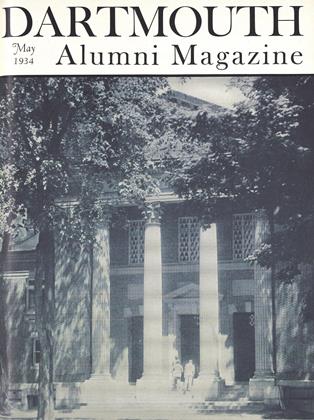Three New Hampshire men were among the five Dartmouth juniors named by President Hopkins on April 10 as recipients of Senior Fellowships for the academic year 1934-35. The men honored with a year of complete freedom from scholastic requirements are Philip N. Guyol, of Concord, N. H.; George F. Hill, of Littleton, N. H.; Richard F. Upton, of Concord, N. H.; George H. Colton, of Springfield, Mass.; and William W. Fitzhugh, of Brooklyn, N. Y.
Under the Senior Fellowship plan, which was inaugurated at Dartmouth in April, 1929, the President upon recommendation of a special committee selects from the junior class a group of outstanding men, usually five, to be Senior Fellows for the following academic year. During the tenure of his Fellowship, the Senior Fellow is not required to attend classes, take examinations, or pay tuition fees. He is given complete freedom to pursue his studies in whatever manner and direction he chooses, but must be in residence at the College throughout the year and must retain his good standing as an undergraduate. At the end of his final year, the Senior Fellow receives his degree in course.
'PLANS TO WRITE BIOGRAPHY
Guyol, who entered Dartmouth from Concord High School, was originally a member of the class of 1927 but left college during his sophomore year. After several years in newspaper work and with Armour and Company of Chicago, he returned to College as a sophomore in the fall of 1932. Guyol, whose major study is history, expects to make a study of European civilization from classical times, and to work on a biography of General John Sullivan of Durham, N. H., a prominent figure in Revolutionary days.
Hill, who will captain the Dartmouth football team this fall, is one of the outstanding student leaders at Dartmouth. In addition to a brilliant athletic record, he has been president of his class for the past two years and is now treasurer of Green Key, the honorary junior society. He won letters in football and baseball during his sophomore year, and last fall won a second football letter despite the handicap of an early-season injury. As a freshman, Hill won numerals in football, baseball, and basketball. This spring he has given up baseball to devote full time to football training. He is a member of Delta Kappa Epsilon fraternity, Sphinx, and the honorary undergraduate Fire Squad. Hill entered Dartmouth from Worcester Academy, where he went for a year following his graduation from Littleton High School in 1930. He is preparing for a medical career, and expects to devote next year to literary, economic, and sociological studies before going into his specialty.
Upton, who is an honors student in history, is planning next year to make a study of the Colonial origins of the United States Constitution, and has already done a great deal of work in this particular field. He is preparing for a career of law, and entered Dartmouth from Phillips Exeter Academy.
Colton, an honors student in Economics, is manager of varsity football and president of Green Key, the honorary junior society. He is a member of Phi Gamma Delta fraternity, Casque and Gauntlet, and Cabin and Trail. Colton, who is planning a business career, expects to work next year in the three fields of history, literature, and philosophy. He graduated from Springfield Technical High School in 1930, and attended Bay Path Institute for a year before entering Dartmouth.
Fitzhugh, who is preparing for the vocation of chemist, plans to continue his regular Chemistry major next year and to supplement this with some original work in the field of micro-chemistry. He is a member of the varsity squash team, and has been active in musical circles, singing with the Glee Club and in productions of The Players. He is a member of Sigma Chi fraternity, Green Key, the Canoe Club, and the German Club. He prepared for Dartmouth at the Polytechnic Preparatory Country Day School in Brooklyn.
 View Full Issue
View Full Issue
More From This Issue
-
 Article
ArticleHANOVER BROWSING
May 1934 By Rees H. Bwen -
 Class Notes
Class NotesClass of 1910
May 1934 By Hanrold P. Hinman -
 Class Notes
Class NotesClass of 1918
May 1934 By Allan C. Gottschaldt -
 Class Notes
Class NotesClass of 1905
May 1934 By Arthur E. McClary -
 Class Notes
Class NotesClass of 1933
May 1934 By John S. Monagan -
 Class Notes
Class NotesClass of 1929
May 1934 By F. William Andres







